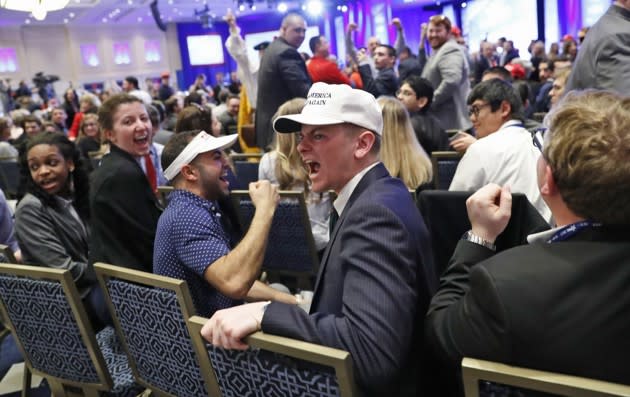The Atlantic Politics & Policy Daily: CPACalypse Now
Today in 5 Lines
During his address at the Conservative Political Action Conference, Donald Trump touted his efforts to uphold campaign promises and doubled down on his attacks against the press. The president also signed an executive order that requires federal departments to appoint regulatory reform officers in an effort to remove “job-killing regulations.” The White House blocked a number of major news outlets from attending a press briefing, including CNN, The New York Times, Politico and The Los Angeles Times. The State Department, which has gone a month without holding its daily press briefings, announced that it will resume regular briefings in early March. The Department of Homeland Security posted a memo stating that it will start collecting proposals in March for the “design and build of several prototype wall structures in the vicinity of the United States border with Mexico.”
Recommended: I Was a Muslim in the Trump White House—and I Lasted Eight Days
Today on The Atlantic
Behind Frenemy Lines: Kansas Governor Sam Brownback’s economic legacy “is going down in flames,” says one GOP lawmaker. The Republican governor, who once suggested that Trump take up his tax plan, is facing backlash from his own party—and it extends “far beyond tax policy.” (Russell Berman)
The Big, BAT Tax: Donald Trump appears to be considering a border adjustment tax proposal by House Speaker Paul Ryan that would “broadly tax imports but remove taxes on exports.” Trump said the policy will lead to domestic job growth, but economists argue “he may be expecting the economically impossible.” (Andrew McGill)
Can’t Hold Us Down: Financial investors were fearful of a Trump presidency during the campaign season, but the U.S. stock market has seen record highs in the months after his election. What’s going on? (Derek Thompson)
Follow stories throughout the day with our Politics & Policy portal.
Snapshot

Recommended: An Actual False-Flag Operation
What We’re Reading
A Little Help?: CNN reports that the FBI refused a request from the White House to “knock down” media reports about the Trump team’s communications with Russia during the 2016 presidential campaign. That request may be in violation of agency guidelines.
‘How Do You Solve a Problem Like Ivanka?’: After the 2016 election, women’s magazines are coming to terms with a new reality: “They cannot continue to cover Ivanka as if she is solely a fashion mogul, or even a glamorous nonpolitical member of the first family.” (Marin Cogan, Politico)
‘The New Cold War’: The New Yorker takes a look back at U.S.-Russian relations and the geopolitical climate leading to Russia’s interference with the 2016 presidential election. Where do we go from here? (Evan Osnos, David Remnick, and Joshua Yaffa)
Meet Michael Anton: The former George W. Bush-era speechwriter and Machiavelli enthusiast penned a controversial essay in September detailing why Trump “needed” to be president. Now as a member of the National Security Council, Anton is in a unique position of power. (Tina Nguyen, Vanity Fair)
Conflicted: Trump’s son-in-law Jared Kushner has expressed intentions to mitigate conflicts between his White House work and his business interests. But it’s still not clear “how he will recuse himself from government matters that could affect his own bank account.” (Justin Elliott and Al Shaw, ProPublica)
Recommended: When Does Contact Between the FBI and the White House Cross the Line?
Visualized
Unpresidented: In this short video, Molly Ball explains the similarities between the Tea Party movement in 2009 and the current wave of anti-Trump resistance. (Dan Lombroso and Alice Roth, The Atlantic)
Question of the Week
This week, we asked you to share what efforts you think could help heal a polarized nation. Here are a few of the responses:
James Johnston emailed to say that education should be America’s first priority because “we are more segregated by education than race. Until we close that gap the condition will prevail.”
Richard Winchell had two suggestions: “1. Term limits 2. Non-partisan Electoral districts.”
David Deufel suggested that “personal encounters with others unlike us are best for growth.” Dolores Pap isn’t so hopeful: “I don’t want anything to do with Trump supporters! Lost cause, in other words! Maybe the next generation will do better.”
Thanks for responding, and stay tuned for next week’s Question of the Week contest.
-Written by Elaine Godfrey (@elainejgodfrey) and Candice Norwood (@cjnorwoodwrites)
Read more from The Atlantic:
This article was originally published on The Atlantic.
